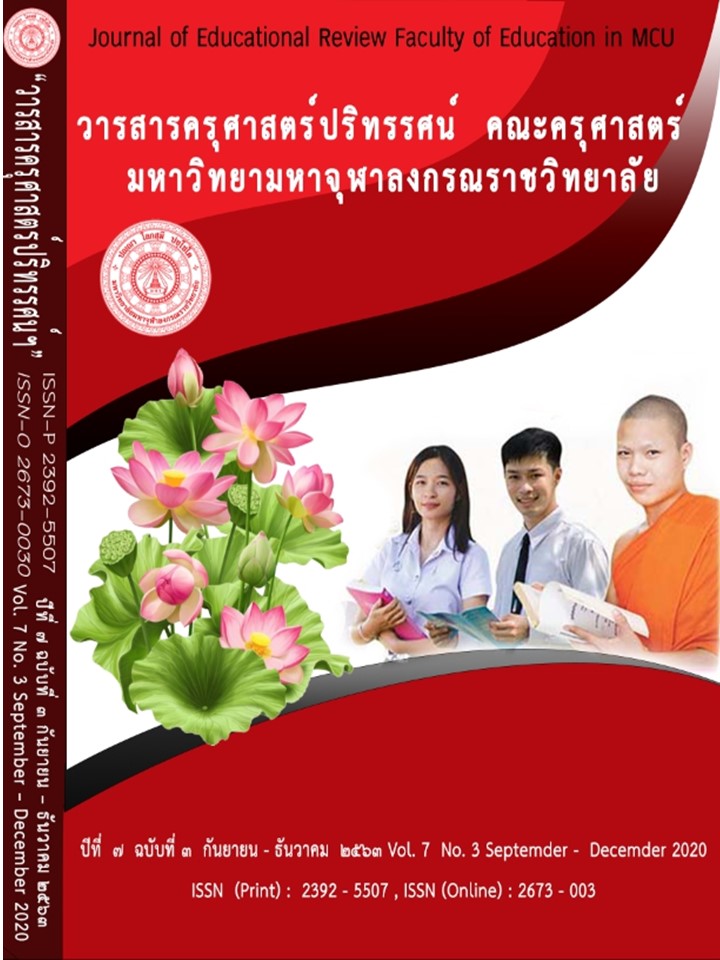การเสริมสร้างความเข้มแข็งของสถาบันครอบครัวตามหลักปรัชญาเศรษฐกิจพอเพียงของกลุ่มชาติพันธุ์ในภาคตะวันตก
Main Article Content
บทคัดย่อ
บทความวิจัยนี้มีวัตถุประสงค์เพื่อ 1) ศึกษาสภาพปัจจุบันของชุมชนชาติพันธุ์ในภาคตะวันตก 2) วิเคราะห์แนวทางการเสริมสร้างความเข้มแข็งของสถาบันครอบครัวตามหลักปรัชญาเศรษฐกิจพอเพียงของกลุ่มชาติพันธุ์ในภาคตะวันตก และ 3) นำเสนอรูปแบบการเสริมสร้างความเข้มแข็งของสถาบันครอบครัวตามหลักปรัชญาเศรษฐกิจพอเพียงของกลุ่มชาติพันธุ์ในภาคตะวันตกที่สอดคล้องกับสภาพการณ์ปัจจุบัน เป็นการวิจัยเชิงคุณภาพ โดยการสัมภาษณ์เชิงลึกผู้ให้ข้อมูลสำคัญ ได้แก่ หัวหน้าหน่วยงานราชการ ผู้นำชุมชน นักวิชาการพัฒนาชุมชนในพื้นที่ภาคตะวันตกของประเทศไทย บริบทเชิงพื้นที่จังหวัดกาญจนบุรี ตามลักษณะการเป็นตัวแทนของกลุ่มที่เหมาะสม จากวิธีการสุ่มแบบเจาะจง 10 ท่าน วิเคราะห์ข้อมูลด้วยวิธีการวิเคราะห์เนื้อหา และการสนทนากลุ่มเฉพาะร่วมกับผู้ทรงคุณวุฒิ ได้แก่ หัวหน้าหน่วยงานราชการ ผู้นำชุมชน และนักวิชาการด้านศาสนา จากการสุ่มแบบเจาะจง 7 ท่าน วิเคราะห์ข้อมูลด้วยการวิเคราะห์เนื้อหาเชิงพรรณนา ผลการวิจัย พบว่า 1) สภาพปัจจุบันของชุมชนชาติพันธุ์ในภาคตะวันตก พบว่า ด้านเศรษฐกิจ มี 12 ประเด็นหลัก ด้านสังคม มี 12 ประเด็นหลัก ด้านการศึกษา มี 13 ประเด็นหลัก และด้านสุขอนามัยและสิ่งแวดล้อม มี 9 ประเด็นหลัก 2) แนวทางการเสริมสร้างความเข้มแข็งของสถาบันครอบครัวตามหลักปรัชญาเศรษฐกิจพอเพียง ครอบคลุม 3 บริบท ประกอบด้วย บริบทอธิสีลสิกขา (ศีล) บริบทอธิจิตตสิกขา (สมาธิ) และบริบทอธิปัญญาสิกขา (ปัญญา) และ 3) รูปแบบการเสริมสร้างความเข้มแข็งของสถาบันครอบครัวตามหลักปรัชญาเศรษฐกิจพอเพียงของกลุ่มชาติพันธุ์ในภาคตะวันตกที่สอดคล้องกับสภาพการณ์ปัจจุบัน พบว่า เป็นรูปแบบการทำงานร่วมกันในลักษณะเครือข่ายสถาบันทางสังคมที่ประกอบด้วยบ้าน/ชุมชน วัด และโรงเรียน/ราชการ เพื่อนำไปสู่การพัฒนากายวาจา เสริมสมาธิและสร้างสังคมอุดมปัญญา โดยนำเอาหลักไตรสิกขาที่สอดคล้องกับหลักปรัชญาเศรษฐกิจพอเพียงมาบูรณาการอย่างเหมาะสมและสอดคล้องกับสภาพสังคมพหุวัฒนธรรมของชุมชนชาติพันธุ์โดยครอบคลุมทั้งด้านเศรษฐกิจ สังคม การศึกษา สุขอนามัยและสิ่งแวดล้อม
Article Details
ทัศนะและความคิดเห็นที่ปรากฏในบทความในวารสารฉบับนี้ถือเป็นความรับผิดชอบของผู้เขียนบทความนั้นเพียงผู้เดียว และไม่ถือเป็นทัศนะและความรับผิดชอบของกองบรรณาธิการ
กองบรรณาธิการขอสงวนสิทธิ์ในการคัดเลือกบทความลงตีพิมพ์และจะแจ้งให้เจ้าของบทความทราบหลังจากผู้ประเมินบทความตรวจอ่านบทความแล้ว
ต้นฉบับที่ได้รับการตีพิมพ์ในวารสารครุศาสตร์ปริทรรศน์ คณะครุศาสตร์ มหาวิทยาลัยมหาจุฬาลงกรณราชวิทยาลัย ถือเป็นกรรมสิทธิ์ของคณะครุศาสตร์ มหาวิทยาลัยมหาจุฬาลงกรณราชวิทยาลัย ห้ามนำข้อความทั้งหมดหรือบางส่วนไปพิมพ์ซ้ำ เว้นเสียแต่ว่าจะได้รับอนุญาตจากมหาวิทยาลัยฯ เป็นลายลักษณ์อักษร
เอกสารอ้างอิง
กระทรวงศึกษาธิการ. (2552). แนวทางการนิเทศเศรษฐกิจพอเพียงสู่สถานศึกษา. กรุงเทพมหานคร: สำนักงานปลัดกระทรวงศึกษาธิการ.
กานดา เต๊ะขันหมาก. (2556). ปัจจัยที่สัมพันธ์กับพฤติกรรมการดำเนินชีวิตตามปรัชญาเศรษฐกิจพอเพียงของนักศึกษามหาวิทยาลัยราชภัฏพระนครศรีอยุธยา. รายงานการวิจัย. มหาวิทยาลัยราชภัฏพระนครศรีอยุธยา.
ขวัญกมล ดอนขวา. (2557). แบบจำลองปรัชญาของเศรษฐกิจพอเพียงและเศรษฐกิจสร้างสรรค์มีผลต่อการพัฒนาเศรษฐกิจของประเทศไทย. รายงานการวิจัย. มหาวิทยาลัยเทคโนโลยีสุรนารี.
ทรงศักดิ์ วงศ์ภูมิวัฒน์ และคณะ. (2550). พระเจ้าแผ่นดินนักส่งเสริมการเกษตร. กรุงเทพมหานคร: กรมส่งเสริมการเกษตร.
บรรยวัสถ์ ฝากคำ และนฤมล ดวงแสง. (2550). การประยุกต์หลักพุทธธรรมเพื่อเสริมสร้างความเข้มแข็งให้แก่สถาบันครอบครัวและชุมชนตามนโยบายการป้องกันปัญหาสารเสพติดของจังหวัดอุบลราชธานี. รายงานการวิจัย. มหาวิทยาลัยมหาจุฬาลงกรณราชวิทยาลัย.
พระมหาสง่า พลสงคราม. (2542). การศึกษาเปรียบเทียบเศรษฐศาสตร์เชิงพุทธกับเศรษฐกิจพอเพียงในสังคมไทย. กรุงเทพมหานคร: มหาวิทยาลัยมหิดล.
พลเดช ปิ่นประทีป. (2542). สู่ความเป็นไทด้วยพลังของท้องถิ่น. กรุงเทพมหานคร: สถาบันชุมชนท้องถิ่นพัฒนา.
ยุทธนา ไชยจูกุล. (2552). การวิจัยและพัฒนาครอบครัวเข้มแข็งโดยผ่านกระบวนการเรียนรู้แบบมีส่วนร่วมของผู้นำองค์การบริหารส่วนตำบล. วารสารพฤติกรรมศาสตร์. 15(1). 162-184.
วิซุตตา ชูศรีวาส. (2559). การดำเนินงานหมู่บ้านเศรษฐกิจพอเพียง บ้านหัวอ่าว ตำบลบางช้าง อำเภอสามพราน จังหวัดนครปฐม. รายงานการวิจัย. มหาวิทยาลัยราชพฤกษ์.
วิฑูรย์ เลี่ยนจำรูญ. (2554). ปฏิรูปเกษตรกรรมเพื่อความมั่นคงทางอาหาร: บทวิเคราะห์และปฏิบัติการทางนโยบาย. นนทบุรี: มูลนิธิชีววิถี.
ศาลินา บุญเกื้อ และนันทกาญจน์ ชินประหัษฐ์. (2557). การถอดบทเรียนและวิเคราะห์อัตลักษณ์ศูนย์การเรียนรู้ตามหลักปรัชญาของเศรษฐกิจพอเพียงด้านการศึกษา. รายงานการวิจัย. ศูนย์สถานศึกษาพอเพียง มูลนิธิยุวสถิรคุณ.
สำนักงานคณะกรรมการข้าราชการพลเรือน. (2559). ปรัชญาของเศรษฐกิจพอเพียงและการประยุกต์ใช้. นนทบุรี: สำนักงานคณะกรรมการข้าราชการพลเรือน.
สำนักงานคณะกรรมการพัฒนาการเศรษฐกิจและสังคมแห่งชาติ. (2550). ปรัชญาของเศรษฐกิจพอเพียง. กรุงเทพมหานคร: โรงพิมพ์ 21 เซ็นจูรี่.
สำนักงานคณะกรรมการพัฒนาการเศรษฐกิจและสังคมแห่งชาติ. (2550). ปรัชญาของเศรษฐกิจพอเพียง. กรุงเทพมหานคร: โรงพิมพ์ 21 เซ็นจูรี่.
เสรี พงศ์พิศ. (2551). แนวคิดแนวปฏิบัติยุทธศาสตร์พัฒนาท้องถิ่น. กรุงเทพมหานคร: พลังปัญญา.


